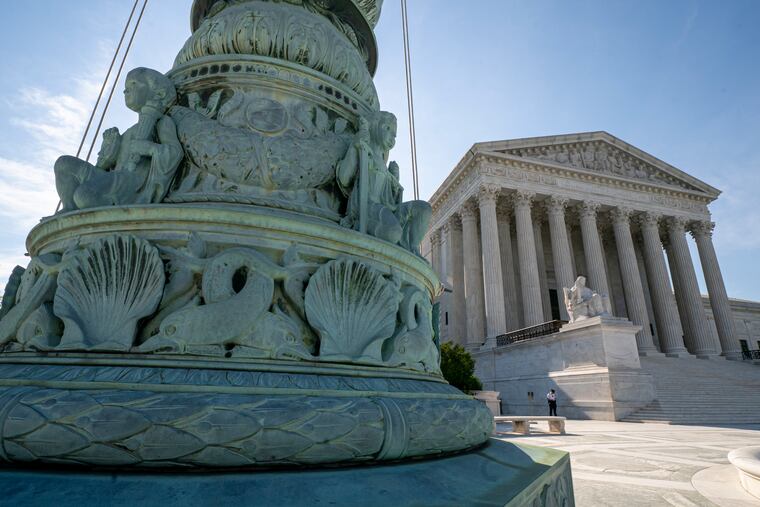Supreme Court to weigh Pennsylvania, N.J. challenge to Trump efforts to roll back birth control mandate
It will be the third time this hotly contested portion of former President Obama’s signature health care law has drawn high court review. But it is the first time the court’s Republican-appointed majority, including Justices Neil Gorsuch and Brett Kavanaugh, will consider the issue.

The U.S. Supreme Court will review a Philadelphia federal judge’s decision last year to block new Trump administration rules that would have let almost any employer deny female workers no-cost birth control coverage by citing religious and moral objections.
In an order late Friday, the justices said they would consider an appeal from White House lawyers, who lost a bid to overturn a nationwide injunction imposed by U.S. District Judge Wendy Beetlestone in January 2019.
The case marks the third time this small but hotly contested portion of the Affordable Care Act has drawn high court scrutiny. But it is the first time that the court’s new majority of Republican appointees — including Justices Neil Gorsuch and Brett Kavanaugh — will hear a contraception case.
At issue is a push in 2017 to expand exemptions to the ACA’s “birth control mandate” with new regulations that would allow all but publicly traded companies, including private colleges and universities that issue student health plans, to opt out on moral grounds.
The attorneys general of Pennsylvania and New Jersey challenged the proposal, saying the rule change could saddle their states with the cost of dealing with thousands of unplanned pregnancies and as many as 127,000 women losing access to no-cost contraception.
A unanimous three-judge panel of the U.S. Court of Appeals for the Third Circuit agreed in May, affirming Beetlestone’s decision.
“Two federal courts have blocked this rule and we are confident the Supreme Court of the United States will do the same,” Josh Shapiro, the Pennsylvania attorney general, said in a statement. If allowed to move forward, he added, the proposed regulation would allow employers to deny contraception coverage for “almost any reason — including the belief that women don’t belong in the workforce.”
But the Little Sisters of the Poor, an order of Roman Catholic nuns that intervened in the Pennsylvania and New Jersey case, argue that they should not be forced to provide coverage at odds with their religious beliefs.
“It is disappointing to think that as we enter a new decade we must still defend our ministry in court,” said Sister Loraine Marie Maguire, mother provincial of the order in the United States. “We are grateful the Supreme Court has decided to weigh in, and hopeful that the justices will reinforce their previous decision and allow us to focus on our lifelong work.”
In crafting her opinion last year, Beetlestone concluded that the Trump administration’s proposed regulations ran counter to both government rule-making procedures and the intent of Congress when it crafted the Affordable Care Act’s contraception provisions. What’s more, she cited the undue financial burden on states that moved in to pick up the tab.
“The negative effects of even a short period of decreased access to no-cost contraceptive services is irreversible,” she wrote.
The birth control mandate has been one of the most fiercely litigated aspects of Obamacare.
Since it was enacted, the ACA has generally required employers and insurers to provide preventative health services to women at no charge. Houses of worship that claimed religious objection were provided an avenue to opt out soon after the law’s passage.
In the decade since — and after a number of court battles — the swath of employers eligible for exemptions has gradually expanded to include religiously affiliated hospitals, universities and nonprofits.
In 2014, the Supreme Court added to that list businesses owned by a small group of owners whose religious beliefs run counter to the contraception provisions after hearing a case from a Lancaster County cabinet maker and Hobby Lobby, one of the nation’s largest craft store chains.
Some of those exempted entities were still required to provide employees with health plans that offer birth control coverage paid by the insurance provider. But religious groups around the nation, including the Little Sisters, challenged that accommodation at the Supreme Court in 2016, arguing it still made them complicit in a violation of their faith.
Since taking office, President Donald Trump has vowed to eliminate even that mandate in seeking to fulfill a campaign pledge he made to protect employers from being “bullied by the federal government because of their religious beliefs.”
Brigitte Amiri, deputy director of the ACLU Reproductive Freedom Project, disputed the president’s claims of defending religious liberty, arguing instead that blocking access to birth control amounts to a form of discrimination.
This "is yet another of the administration’s many attacks on access to abortion and contraception,” she said in a statement. “We hope the Supreme Court will uphold the lower courts’ rulings blocking this awful law.”
The justices are likely to hear arguments on the case in April and decide it by late June.